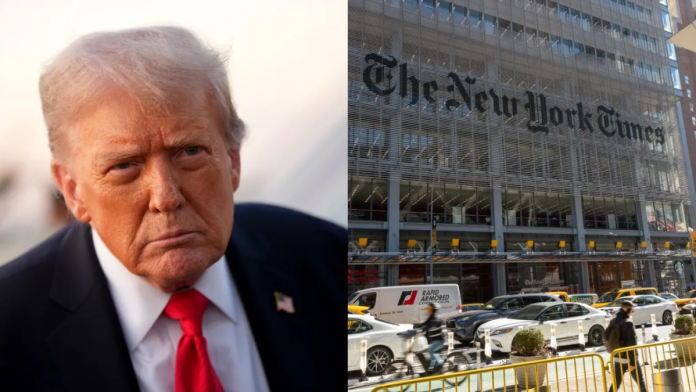President Donald Trump declared himself “winning” after a federal judge dismissed his $15 billion defamation lawsuit against The New York Times. The suit, which targeted articles published before the 2024 election, was rejected by U.S. District Judge Steven Merryday, who described the filing as “improper and impermissible.”
Judge Merryday emphasized that the dismissal was based on procedural grounds rather than the truth of the allegations. He noted that Trump’s complaint did not comply with the legal requirement to provide a “short and plain” statement explaining why he believed he was defamed. Instead, the filing included lengthy arguments, extensive evidence, and explanations that the judge deemed unnecessary and overly complicated.
The lawsuit claimed that The New York Times published false statements that damaged President Trump’s reputation and business interests. In legal terms, this type of claim is known as defamation, which occurs when false statements are made about someone in a way that can harm their reputation.
Despite the court’s dismissal, President Trump told reporters that he is “winning” the case. He criticized major news networks for what he called biased coverage against him. During the press interaction, he specifically called ABC News reporter Jonathan Karl “a terrible reporter” and accused the networks of being “very unfair.”
President Trump files defamation lawsuit seeking $15 billion from The New York Times
Judge Criticizes Lawsuit Filing
The $15 billion lawsuit claimed that The New York Times caused serious damage to Trump’s professional and occupational interests. Judge Merryday, a George H. W. Bush appointee, said the filing included a “tedious and burdensome aggregation of prospective evidence” and “protracted recitation and explanation of legal authority,” which made it difficult to understand the basis of the claims.
The court made it clear that the ruling did not address whether the allegations themselves were accurate. Instead, it focused solely on how the complaint was presented. The judge allowed President Trump’s legal team, which also included Penguin Random House as a defendant, to refile the lawsuit if they could correct the procedural issues and present the claims in the required format.
The judge also noted that the original complaint appeared more like a political document rather than a legal filing, meaning it read more like a statement meant to make a political point rather than a clear, structured legal claim.
President Responds While Addressing Media Coverage
After the ruling, President Trump spoke to reporters, including Jonathan Karl from ABC News, and insisted he was “winning the cases.” He argued that the media coverage he has received is biased and at times “illegal,” while also describing himself as a strong supporter of free speech. He referenced voter support in certain counties to underline his popularity, claiming that despite winning elections in multiple areas, most news coverage remains unfavorable to him.
Harvard placed under strict cash monitoring as Trump administration intensifies oversight
Trump also continued his broader criticism of the media, expressing dissatisfaction with the negative portrayal of him in news reports and late-night shows, mentioning Jimmy Kimmel’s ABC program in passing. The president’s legal team issued a statement saying that Trump will continue to hold the news outlet accountable through the lawsuit, following the judge’s guidance on proper filing procedures.
Meanwhile, The New York Times welcomed the judge’s ruling, describing the original complaint as “a political document rather than a serious legal filing.” This is consistent with the newspaper’s past statements regarding Trump’s previous legal actions, including lawsuits filed in 2021 and 2023, which were also dismissed without the courts ruling on the merits of his claims.
The case drew attention not only because of its enormous financial demand but also because of how the complaint was presented. The ruling highlights the importance of adhering to procedural standards in legal filings, even for a sitting president.
